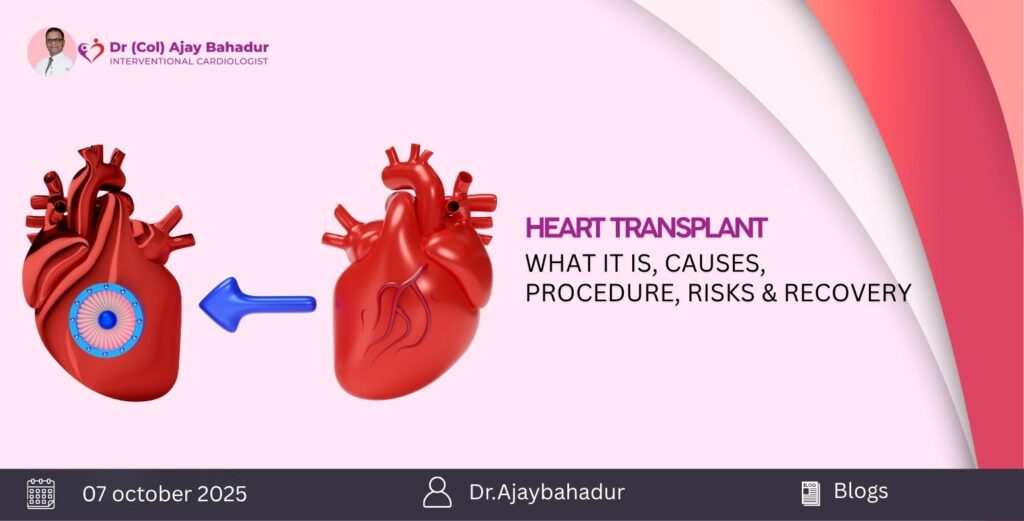Heart Transplant: What It Is, Causes, Procedure, Risks & Recovery
A heart transplant is a life-saving surgery in which a failing heart is replaced with a healthy donor heart. It offers hope to people with severe heart failure who have no other effective options. In this article, you’ll learn what a heart transplant is, why it’s needed, how it’s done, the risks, and how recovery works. If you’re searching for the best heart specialist in Lucknow– Dr. Ajay Bahadur, this article helps you understand whether a heart transplant may be needed.
What Is a Heart Transplant & Who Needs It?
A heart transplant means removing a person’s damaged heart and replacing it with a donated heart from a suitable donor. It is a major surgery reserved for people whose hearts are failing despite all other treatments.
Common reasons (causes) that may lead to considering a heart transplant include:
- Severe heart failure (when the heart cannot pump enough blood)
- Cardiomyopathy (weakening of the heart muscle)
- Coronary artery disease or multiple heart attacks
- Congenital heart defects in children or adults
- Heart valve disease that cannot be repaired
When these conditions severely impair the heart’s function and other treatments (medicines, devices) are no longer effective, doctors may refer you for evaluation for a transplant. At that point, working with the best cardiologist in Lucknow like Dr. Ajay Bahadur helps ensure you are assessed properly.
How the Heart Transplant Procedure Works
Here is a simplified, step-by-step view:
- Evaluation & listing
Before surgery, you undergo many tests (blood tests, imaging, lung function, etc.) to confirm you’re eligible. You’ll be placed on a waiting list for a donor heart. - Donor match & preparation
When a suitable heart donor becomes available, your medical team ensures compatibility (blood type, size, tissue matching). You are admitted, prepared, and put under anesthesia. - Removal of diseased heart
Surgeons stop your heart temporarily and connect you to a heart–lung bypass machine. They remove your damaged heart, leaving small parts of the blood vessels in place. - Implantation of donor heart
The donor heart is sewn into place, connecting major blood vessels. Once secured, the new heart is restarted and monitored closely. - Immediate post-surgery care
You stay in the intensive care unit (ICU), with close monitoring of heart function, immunosuppressive (anti-rejection) medicines, breathing support, and careful fluid balance.
Risks & Complications
Every major surgery has risks. For a heart transplant, the key risks include:
- Rejection: Your immune system may try to reject the new heart. You must take anti-rejection medications for life.
- Infection: Immunosuppression increases vulnerability to infections.
- Bleeding or clotting: During or after surgery, bleeding or the formation of clots is possible.
- Graft failure: The donor heart might fail early or late.
- Side effects of medications: Drugs to prevent rejection can affect the kidneys, bones, and other organs.
- Other complications: Issues like diabetes, high cholesterol, high blood pressure, or cancers may develop due to long-term immunosuppression.
The best heart doctor in Lucknow, especially one experienced like Dr. Ajay Bahadur, will counsel you thoroughly about these risks and monitor you regularly.
Recovery & Life After Heart Transplant
Recovery from a heart transplant is a long journey, but many people go on to live active, meaningful lives. Key stages and tips include:
- Hospital stay: After surgery, you may stay several weeks in the hospital (ICU first, then general ward).
- Medication management: You’ll take anti-rejection drugs, along with other medicines (blood pressure, cholesterol, etc.).
- Follow-up & surveillance: Regular checkups, blood tests, heart biopsies, or imaging to detect rejection or complications.
- Lifestyle changes: You must adopt heart-healthy habits — a balanced diet, avoiding smoking, controlling weight, and managing stress.
- Gradual activity: Physical therapy helps you rebuild strength. Over months, you can resume many daily activities.
- Long-term monitoring: Lifelong follow-up with a cardiologist is essential to manage medications, detect complications, and maintain heart health.
When you choose the best cardiologist in Lucknow – Dr. Ajay Bahadur, you gain a partner in this long-term journey. His experience and patient-centric care help optimize outcomes and quality of life after transplant.
Why Trust Dr. Ajay Bahadur for Heart Care
Dr. Ajay Bahadur is a renowned cardiologist and the best heart specialist in Lucknow with decades of clinical experience. Becausea heart transplant is complex, having a doctor you trust is critical. Patients under his care benefit from expert evaluation, tailored plans, close follow-up, and adherence to modern protocols.
If you or a loved one is exploring heart transplant or advanced heart care, consulting with the best heart doctor in Lucknow – Dr. Ajay Bahadur – is a wise step to ensure you receive expert guidance and compassionate care.
Conclusion
A heart transplant can offer a new lease of life for patients with severe heart disease. Understanding the causes, procedure, risks, and recovery helps you make informed decisions. Choosing the best heart doctor in Lucknow, such as Dr. Ajay Bahadur – a trusted cardiologist – ensures you have a caring and experienced partner throughout the process.
FAQs –
1. What is a heart transplant?
A heart transplant replaces a diseased heart with a healthy donor heart. – Dr. Ajay Bahadur
2. What causes a heart transplant?
Severe heart failure, cardiomyopathy, valve disease, or congenital defects may need a transplant. – Dr. Ajay Bahadur
3. How is a heart transplant done?
The damaged heart is removed and replaced with a donor heart under anesthesia using a heart-lung machine.
4. What are the risks?
Risks include rejection, infection, blood clots, or surgery complications. – Dr. Ajay Bahadur
5. How long is the recovery?
Hospital stay is 4–6 weeks, with months of gradual recovery and lifelong follow-up.
6. Lifestyle changes after transplant?
Take medications, eat heart-healthy foods, exercise moderately, and avoid infection.
7. How long does a transplanted heart last?
With care, a heart can last 10–20+ years, depending on health and lifestyle.


